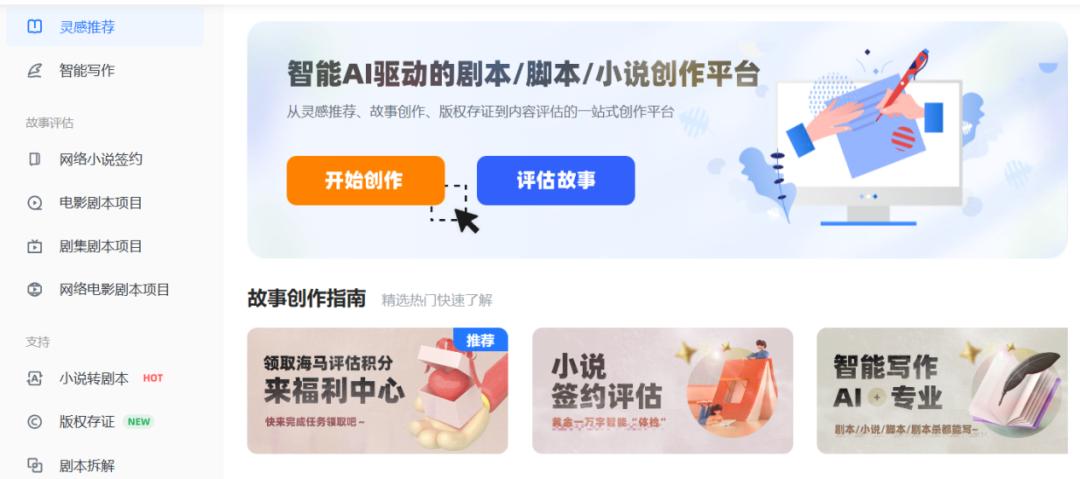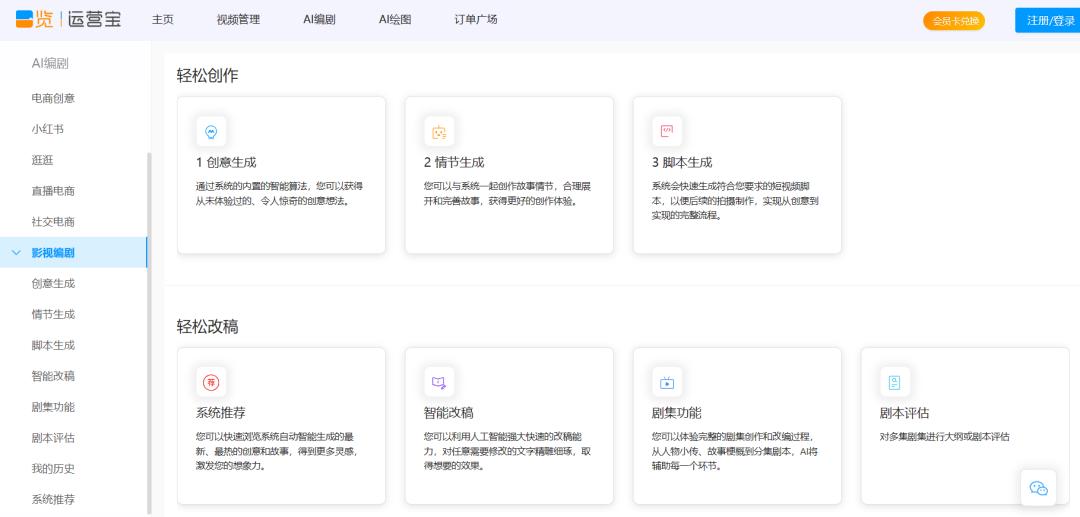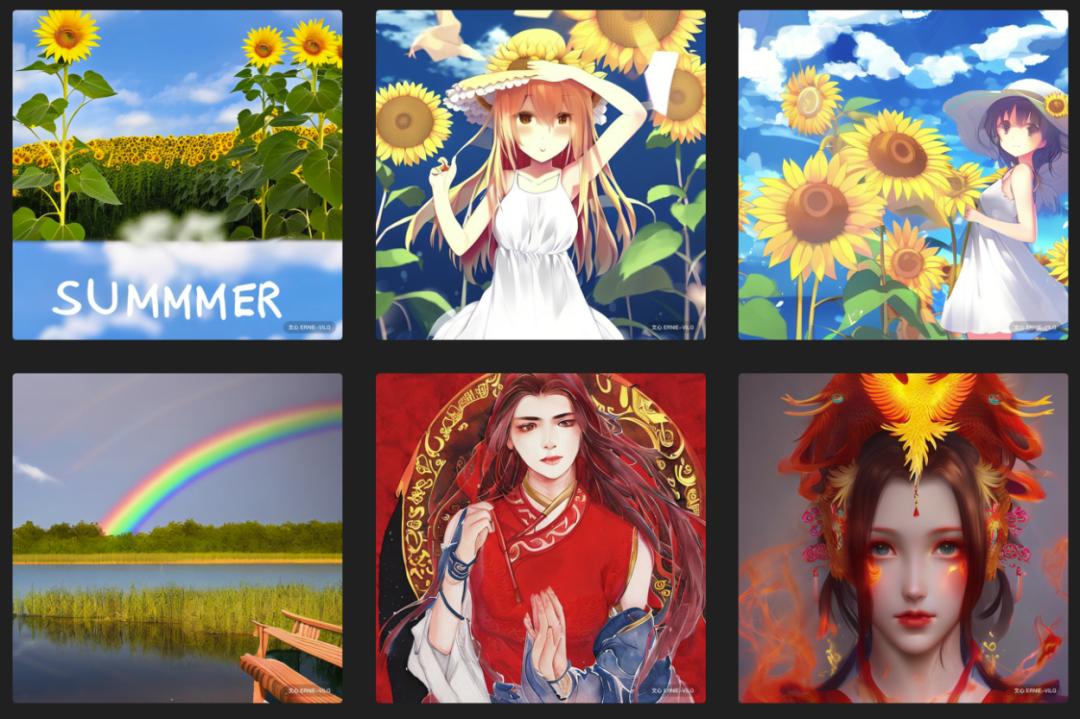When Screenwriters Face AI Writers: Has AI's Impact on Creativity Already Begun?
-
In October last year, the release of ChatGPT quickly sparked global discussions about AI potentially replacing human creative work. In Hollywood, creative professionals such as screenwriters and directors have been leading these conversations.
In March this year, domestic AI models like Baidu's ERNIE Bot and Alibaba's Tongyi Qianwen were released. Subsequently, several film and television companies publicly announced plans to integrate AI-generated content into their operations.
Naturally, this includes the foundational stage of storytelling: scriptwriting. Platforms like iQiyi, Tencent Video, and Youku have mentioned in various contexts their intentions to strengthen AI applications in the film and television industry, including exploring AI-assisted scriptwriting.
Recently, Huace Film & TV's AIGC Application Research Institute launched an in-house "Intelligent Scriptwriting System" for its business teams.
These discussions have further spread across the entertainment industry. Against this backdrop, East & West Entertainment surveyed several screenwriters and, based on ongoing research, compiled insights into the potential impacts. Our analysis can be found in Part 3.
Acknowledgments: This article thanks the many professional screenwriters from TV series, films, short dramas, and gaming who participated in the survey, as well as Huace Film & TV, Haima Qingfan, and Yilan Technology for their support. The order of acknowledgment is random.
Screenwriters with a positive attitude towards AI have already incorporated tools like ChatGPT for dialogue simulation or Claude for storyline construction into their daily work routines. They believe AI can offer new perspectives for their creativity and provide valuable suggestions on certain details.
Overall, when discussing the impact of AI on creative writing, the opinions of multiple screenwriters who have used these tools converge on two main points:
-
AI can assist in the early stages of creative brainstorming, offering more possibilities and directions, and helping screenwriters quickly filter and identify the most promising storylines.
-
AI can address some daily efficiency issues, such as automating repetitive tasks, searching for similar plotlines, or background research.
On the other hand, screenwriters who are more conservative about using AI tools focus on the irreplaceable aspects of human creativity. They argue that true creativity, depth of thought, and emotional richness cannot be replicated by machines. They worry that AI might lead to formulaic writing, loss of originality, and detachment from the complexities of human nature.
"Currently, AI-generated scripts lack vitality because a creator's experience is deeply personal. Good works must stem from the author's own life experiences or profound understanding, while AI-generated content lacks the authenticity of lived experience," one screenwriter commented.
Yu Gang, founder of Time Matrix and sci-fi director, stated that using AI in screenwriting collaboration is currently unfeasible: "AI can only help with data collection now, but core creative work is fundamentally impossible for it to accomplish."
Some screenwriters emphasized that due to quality requirements, they are not considering incorporating AIGC into their current production workflows.
A more AI-experienced screenwriter told EW Media that generative AI's strengths lie in its learning and integration capabilities. When used as a creative source or research tool, its convenience can surpass most data platforms. However, AIGC tools' weakness is their lack of perceptual abilities - precisely where human imagination flourishes.
"Veteran screenwriters who didn't grow up in the internet era naturally have lower acceptance of AI," said Liu Xiaoyi, founder of Hippo Sail. "But the new generation, whose behaviors are inseparable from the internet, are more willing to pay for internet products and have higher acceptance of new things."
She noted that ChatGPT's popularity brought them a business surge: "ChatGPT became so hot that people came to consult and trial it, wondering if it represents an epoch-making transformation."
According to official information, Hippo Sail was founded in November 2016 as China's first entertainment technology company applying AI to quantify content creation patterns. Their self-developed AI algorithms serve various content forms including novels, screenplays, and short video scripts. In 2021, they launched an intelligent writing tool featuring functions like automated script formatting, scene-character data management, novel-to-script conversion, and material recommendations.

Haima Qingfan stated that most users of its intelligent writing tool are young creators, with over 1.3 million users accumulated so far.
Liu Xiaoyi mentioned that as one of China's earliest AI screenwriting products, user feedback highlights four core features of Haima Qingfan's intelligent writing tool:
- Plot Suggestions: AI recommends numerous plot segments for screenwriters to choose from.
- Dynamic Script Viewing: The script is displayed dynamically, making it easy to navigate. For example, the tool can extract all character arcs or highlight specific scenes upon request.
- Real-Time Evaluation: Users can evaluate and revise scripts on the fly, allowing for immediate improvements.
- Novel-to-Script Conversion: Tailored for the rise of micro-dramas, this feature converts popular novels into short drama scripts with one click, showcasing the transformative impact of AIGC on screenwriting.
Unlike Haima Qingfan's focus on script evaluation and writing, Yilan Technology approaches AI screenwriting from a "video AIGC workflow" perspective with its "AI Screenwriter" module.
Yilan Technology emphasizes the ability to generate multiple creative ideas and plot options in a shorter time as a key feature of its AI screenwriting module.

Luo Jiangchun, founder of Yilan Technology, stated that directors and producers often need to choose between multiple creative ideas and plotlines. While traditional screenwriters might struggle to produce 3-5 plotlines in a day, AI assistance can multiply this output exponentially, significantly reducing the pressure on writers.
Regarding concerns about AI tools potentially replacing screenwriters, Liu Xiaoyi believes that the automation of scriptwriting actually elevates the baseline quality of stories and creates more opportunities for newcomers in the field. She maintains that talented screenwriters remain valuable and will continue to grow in worth.
"What AI brings is improved creative efficiency, not replacement. The better a screenwriter is, the less they fear being replaced and the more they embrace technological trends," Liu added.
Beyond film screenwriting, AI narrative tools are expanding into various creative fields. Liu noted that Haima Qingfan's applications now include short videos, script-based games (like murder mystery games), and novel writing, with significant user growth observed in short video and script-based game sectors.
At the end of 2022, Baidu's ERNIE-VILG large model collaborated with leading murder mystery game platform Xiaohaitan to organize an AI-generated character design competition. The former provided AI drawing技术支持 while the latter handled promotion within the industry, with script studio Qingyinmen offering IP support.

Immersive murder mystery scene generation based on ERNIE-VILG modelAccording to official statements, this multi-party collaboration uses visual content to辅助文字创作, attracting players with精美图片物料 to create new product formats like "full-image murder mystery games." For content creation itself, visual aids often help inspire creativity, improve efficiency, and shorten production cycles.
By late 2022, screenwriter Xiaoyu (pseudonym) had begun using ChatGPT and other models to assist in script writing. As a young screenwriter in the film industry and writer for a hit virtual human short drama, Xiaoyu's professional background makes him particularly敏锐 to new technologies.
He admitted that while most screenwriters remain cautious, influenced by industry trends and practical applications, he's observed many creators beginning to embrace these new technologies. The demand for AIGC-assisted scriptwriting has been effectively stimulated.
The company he works for has recently joined the ranks of numerous AIGC applications by proposing a plan for AIGC virtual humans.
The direction of interactive storytelling is embracing new opportunities under the iteration of AIGC tools.
A screenwriter specializing in interactive content told East-West Entertainment, "Based on previous experience with interactive plots, we are experimenting with presenting a scenario to AI and letting it speculate on various possibilities. Since AI aggregates big data, it generates a variety of common online tropes and developments, which we then use as an 'inspiration database' to select from."
Screenwriter An (pseudonym), currently working in the gaming industry, began experimenting with ChatGPT in April. She provides ChatGPT with a character's persona and asks it to speak in that character's voice.
"It's generally not directly usable, but the information and vocabulary collected by GPT can inspire me," she said.
An feels that compared to the screenwriting community, the gaming industry is more open to using AI.
"Some use it to sketch diagrams, others to draft requirements, and there are indie game developers who use AI for drawing," she said. AI tools can help speed up lightweight content creation. For example, in indie game development, text and images with lower requirements can be quickly generated using AI, while larger studios can deploy multiple AIs, with humans only needing to review and make judgments.
The expected efficiency improvements from AI are driving platforms and more film companies to explore new production pipelines in the film and television industry.
Today, with advancements in generative AI and large model applications, domestic models have integrated scriptwriting capabilities. From the broader perspective of China's AIGC industry, major models like Baidu's ERNIE Bot and Alibaba's Tongyi Qianwen have been released, demonstrating scriptwriting abilities to some extent.
At a Baidu press conference in March, ERNIE Bot summarized The Three-Body Problem and proposed five angles for continuation; Tongyi Qianwen has also shown similar capabilities through various tests.
Regarding recent experimental projects observed, a representative from Huace Film & TV's Digital Growth Center noted that while these projects may not yet match human screenwriters in artistic and intellectual depth, they have demonstrated the potential of AI technology.
"The script is the foundation of a production and the most critical element in film and television. In the long run, AIGC will undoubtedly assist in scriptwriting, such as in rapid idea generation, multi-angle inspiration, and script evaluation," the Huace Film & TV representative stated.
At the end of September, Huace Film & TV announced the launch of its self-developed "Intelligent Script Creation System" by its AIGC Application Research Institute. Currently, this application is primarily used by the company's business teams. The system, based on a proprietary vertical large model for scripts, provides tools such as "Evaluation Assistant" and "Screenwriting Assistant.
The Evaluation Assistant supports ultra-long Chinese texts, reducing the time required to evaluate scripts of 200,000 to 500,000 words from three days to just five minutes. The Screenwriting Assistant, designed as an efficient workflow, addresses inefficiencies in multi-round dialogues.
With major tech companies and film studios entering the field, the application of AI in scriptwriting is expected to accelerate, bringing significant industry-wide impacts.
In the long term, generative AI will lower the barriers to creative work and increase content supply, further highlighting the scarcity of high-quality content and driving long-term value appreciation for top-tier productions.
Beyond scriptwriting, AI applications in script analysis and evaluation will further advance the development of the film and television industry. Recent disclosures from iQiyi show that generative AI achieves over 90% accuracy in deconstructing script scenes and characters. Additionally, using large models to extract core information from scripts can assist in pre-production evaluations, enabling more precise budget planning and resource management.
As AI scripts find applications in diverse formats such as short videos and script-based games, they are unlocking even greater narrative possibilities.
In fact, starting with short stories, the creation of narratives has become more "automated." Multiple cases tracked by East-West Entertainment reveal that AI-generated short films and series are continuously emerging, both overseas and domestically. This has profound implications for the ecosystem of story production and consumption.
Moreover, as automation increasingly replaces manual labor, future narratives may inevitably be influenced more by algorithmically generated elements. Audiences are also becoming more inclined to actively engage in interactions rather than passively waiting for storytellers to present narratives to them. This will create space for new forms of content in the future, with impacts that could be profound and far-reaching.
-
